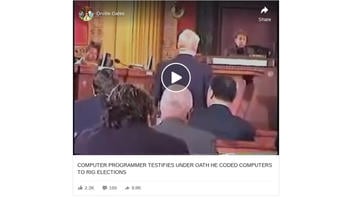
Is this video of testimony about programming that can allegedly rig elections a description of 2020 elections systems? No, that's not true: The taped testimony of Clint Curtis is outdated. At the time the video was recorded, December 13, 2004, Curtis worked as a computer programmer. Under oath, he alleged that he created a program that could secretly fix elections. He said he had no knowledge of whether it was used. Curtis's account has been disputed.
The video appeared in a Facebook post (archived here) published March 7, 2016. Although it's several years old, the post was being shared widely on February 1, 2021. It read:
COMPUTER PROGRAMMER TESTIFIES UNDER OATH HE CODED COMPUTERS TO RIG ELECTIONS
This is what the post looked like at the time of writing:
(Source: Facebook screenshot taken on Mon Feb 1 17:47:07 2021 UTC)
The post is not wrong so much as it is incomplete. It's missing context.
To begin with, people who see and share the post in 2021 might reasonably assume that the video was in reference to the 2020 presidential election -- former President Donald Trump and his supporters alleged widespread fraud, a claim that went unproven -- but the video is not recent. It's from December 13, 2004, a time before iPhones, Twitter, Reddit, Amazon Web Services and the now-long-outmoded Microsoft Vista operating system.
Specifically, the roughly 12-minute video shows Curtis's testimony in a hearing with the Democratic staff of the U.S. House Judiciary Committee, which was looking into allegations of voting irregularities in Ohio around the 2004 election. His comments refer to events that he said took place before the 2000 election. Curtis was asked:
Are there programs that can be used to secretly fix elections?
He responded: "Yes." He was asked:
How do you know that to be the case?
Curtis responded:
Because in October of 2000, I wrote a prototype for present Congressman Tom Feeney at the company I worked for in Oviedo, Florida, that did just that.
Later in his testimony, which was under oath, Curtis said that he did not know whether the program he created was ever used.
Lead Stories reached out to Curtis's former employer to ask about that company's role in the activities Curtis alleges he undertook. We will update, as appropriate, if we receive a response.
For his part, Feeney has disputed Curtis's account. The newspaper now known as The Tampa Bay Times reported in 2005 that the former representative said that he didn't remember ever meeting with Curtis and never had a conversation about rigging elections. Here's The Tampa Bay Times, quoting Feeney:
'He accuses me of participating in or committing treason, murder, even worse -- everything you can think of in the book he publishes in the summer of 2004 ... but he doesn't accuse me of tampering with an election until the election controversy in Ohio arose,' referring to unproven allegations of voting irregularities in 2004 that some Democrats say cost John Kerry the election.
Feeney also said:
All I can tell you is I didn't do any of the illegal things Curtis says I did ... and I didn't lead the purple Martian invasion of Earth either.
Curtis went on to challenge Feeney for his seat in the U.S. House of Representatives in 2006. More recently, Curtis, a Democrat, challenged Congressman Michael Waltz, a Republican, in the 2020 election. He lost both races.
Lead Stories reached out to Curtis to ask about the old video and whether he feels like what he said then is still relevant. He said:
It's actually more likely that things can be stolen now than it was even then.
Curtis, who works as an attorney, argued the merits of paper ballots and hand counts. He added:
As long as you're going to use machines, we're going to have people arguing about whether the elections are valid forever because they may never be. But they might be. You'll never know.
In the wake of the 2020 election, the U.S. Cybersecurity & Infrastructure Security Agency (CISA) has addressed the issue of voting system software, stressing that it cannot be easily manipulated and that widespread use of paper ballots provides the kind of audit trail by which tallies can be tested. Read CISA's comments on the subject here.
Lead Stories has also published fact-checks on allegations of vote switching. See our stories here, here and here.


















